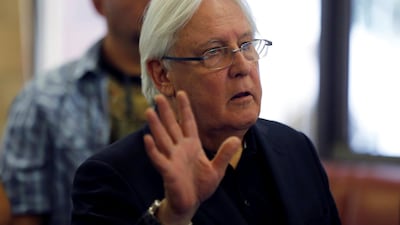In the biggest effort since 2016 to achieve peace in Yemen, UN-led talks next month will start with the country’s warring sides in the same city – Geneva – but not the same room.
UN special envoy Martin Griffiths will mediate between the Yemeni government and Iran-backed Houthi rebels.
The use of more UN intermediaries, rather than face-to-face talks, follows the same pattern as the UN’s peace talks in Syria and is designed to ensure that progress, however limited, can be made.
The Yemen discussions will primarily focus on the Houthi-held port city of Hodeidah, the disarming of all non-government forces and the release of prisoners on both sides, a government official told The National.
Houthi rebels have asked for political recognition and control over some areas of the country, the official said.
A UN proposal on Hodeidah, a major port, would hand the Red Sea harbour over to the UN and put the city under the control of security forces.
“The two parties are going to discuss and reach a deal on what kind of security forces and how they should be selected under the supervision of the UN,” said Yemeni political analyst AbdulKhaliq Al Hood.
This would mean the UN taking over the management of the port, giving the Arab Coalition the space to focus its military and aid efforts on other parts of the country.
The two factions are also expected to discuss the reunification of Yemen’s central bank, which could ensure payment of the salaries of state employees in liberated and Houthi-controlled areas.
“This deal would include unifying the economic resources, which means that the Houthis are expected to agree to transfer all the revenue of the economic resources under their control,” Mr Al Hood said.
__________
Read more:
Coalition criticises UN 'bias' in reporting on civilian deaths
Yemen rebels attacked UN food store near Hodeidah, says minister
UN report on Yemen requires review: UAE Minister of State for Foreign Affairs
_________
Last month, Yemen's Foreign Minister Khaled Al Yamani told The National that the starting point to a solution would have to involve the Houthis withdrawing from and handing over Hodeidah.
While the Houthis have agreed to the UN taking control of Hodeidah port, they have so far refused to withdraw from surrounding towns as requested by the UAE and the coalition.
The talks have not been without controversy among interested parties.
Yesterday, a UN document describing a Houthi leader as the “leader of the revolution” caused uproar among some Yemenis. One social media user accused the UN of being “more Houthi than the Houthis themselves”.
Cinzia Bianco, an analyst for Gulf State Analytics, said Mr Griffiths had differed markedly from his predecessors in trying to broker a solution to the war, which broke out in 2015.
“Rather than tackling comprehensively a resolution to the conflict, he appears to be more focused on specific issues,” Ms Bianco said.
“Lately, he has been devoting most of his efforts to bringing the Hodeidah campaign to an end.”
A more complex item on the agenda will be the release of prisoners on both sides.
“They have been trying to reach a deal since the first talks in Geneva and in the second talks in Kuwait to release thousands of prisoners captured on the battlefields and others who were politically arrested but didn’t participate in the fighting,” Mr Al Hood said.
Some of the captives are top Yemeni officials, including Minister of Defence Brig Mahmood Al Sobaihi, Naser Mansur Hadi – the brother of President Abdrabu Mansur Hadi – and brigade commander Maj Gen Faisal Rajab.
A successful outcome on September 6 could set in motion a series of trust-building measures and create potential for successful peace talks later this year.
In addition to the government and the Houthis, Yemen’s Southern Transitional Council has said it wants to send a delegation of five senior members to the Geneva talks.
Despite talks of reconciliation, clashes between the Iran-supported Houthis and Yemen’s coalition-backed forces continue.
On Wednesday rebels reportedly fired a ballistic missile at Saudi Arabia's Najran region near the border between the two countries.
The Badr-1 missile targeted "a new military camp," it said, without indicating when the missile was launched.
Saudi Arabia's military said on Tuesday its air defences intercepted a missile fired towards the city of Najran. "There were no casualties," said the spokesman of the Saudi-led coalition fighting the Houthis, Colonel Turki Al Malki.

